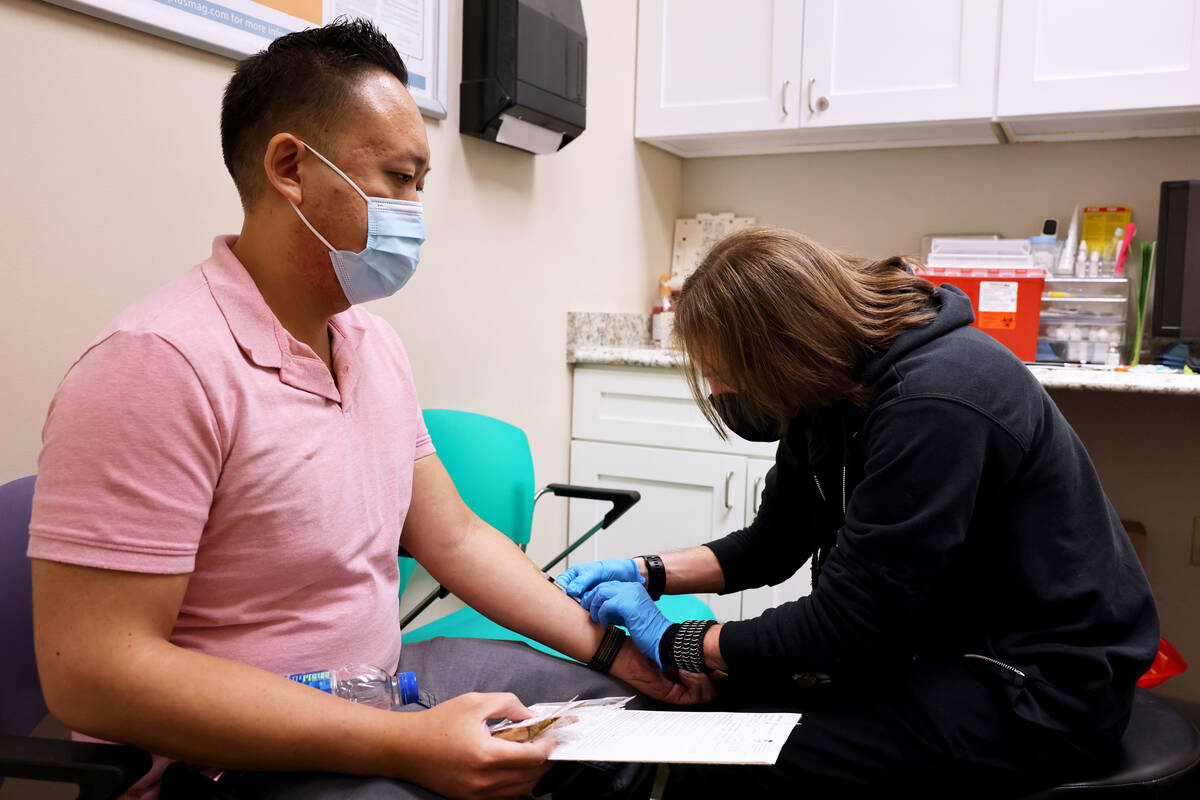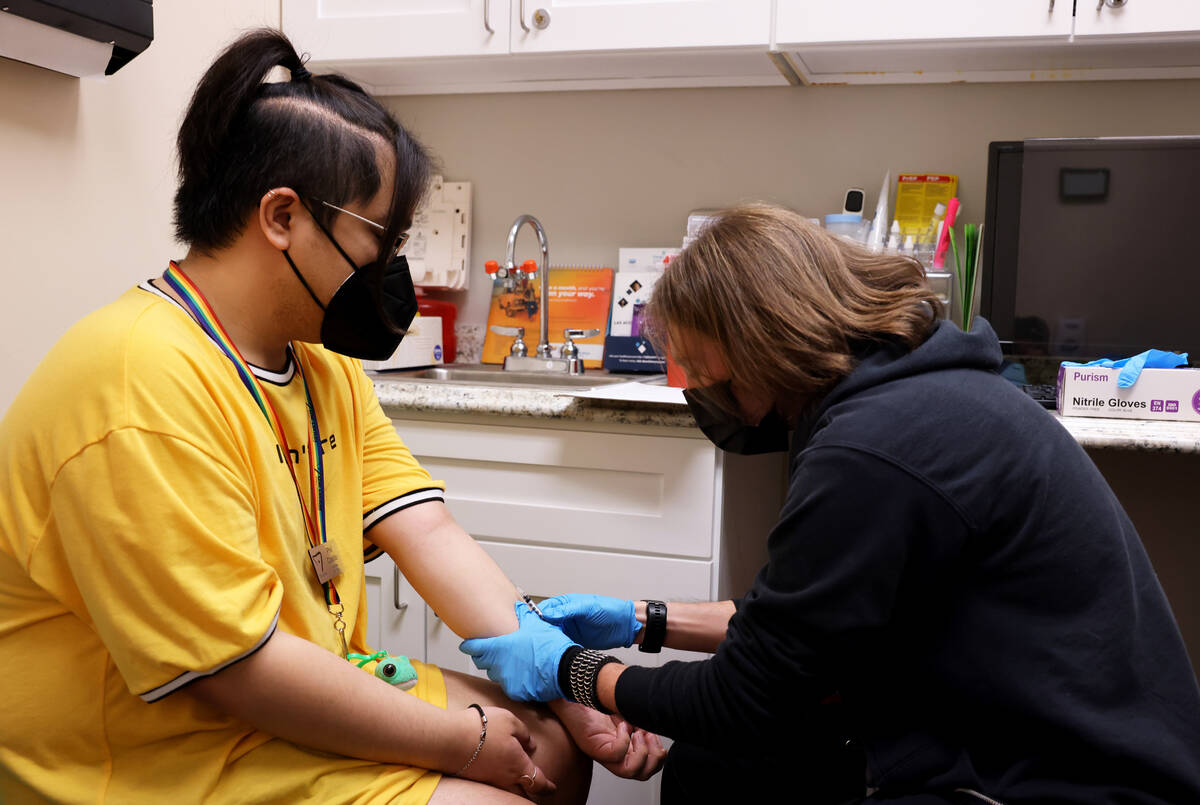Cases of monkeypox rise by one-third in Clark County
Confirmed cases of once-rare monkeypox rose by one-third over the past week in Clark County, according to data released Wednesday by the Southern Nevada Health District, an increase a district official described as concerning.
The number rose to 134 from 100, an undercount resulting from lags in testing and reporting, Cassius Lockett, the district’s director of disease surveillance and control, said in an interview.
Of the total number, 130 infections have been in men. Four have been in those who are transgender, gender nonconforming or women; the district does not specify which, citing privacy concerns.
The majority of cases across the U.S. have been in men who have sex with men, with the virus spreading through social networks, public health authorities say.
“My fear is if we don’t get this under control, through a combination of vaccination and the whole behavioral change that needs to take place in the community, we run the risk of monkeypox in the United States becoming endemic and spilling over into the general population,” Lockett said.
Monkeypox is primarily spread through close, intimate skin-to-skin contact, especially sex, and often through direct contact with the rash or lesions that characterize the disease, health authorities say. It can also spread through respiratory secretions during prolonged face-to-face contact.
Although the disease primarily has affected men who have sex with men, anyone who is exposed, including women and children, can contract the virus. However, the risk to the general population remains low at this time, Lockett said.
Approach to vaccination varies
The Jynneos vaccine can prevent illness or reduce symptoms even in those who already have been exposed, especially if administered within four days of exposure, according to health authorities.
With vaccine in limited supply, the health district restricts vaccination to those at high risk, which includes people with a known or suspected exposure, some of whom are identified through the district’s contact tracing. Also eligible are men and transgender people who have sex with men, who in the past 14 days have had multiple sex partners.
According to the health district’s most recent data, 70 percent of cases have been in people who are LGBTQ and 2 percent in heterosexuals, with the gender identify of 28 percent unknown. The individuals range in age from 18 to 64.
Other health clinics providing the vaccine, including the Huntridge Family Clinic and The LGBTQ Center of Southern Nevada, have taken a less restrictive approach to administering vaccine, representatives said.
The Huntridge Family Clinic, which serves the LGBTQ community, has not turned anyone away so far, nurse practitioner Rob Phoenix said.
“We are essentially giving (the vaccine) to anyone who comes in and self-identifies that they need it,” Phoenix said. He considers any person at some risk if they have more than one recent sexual partner, “regardless of who they identify as or the gender of their partners.”
The clinic has vaccinated more than 500 people, including a grandparent and other household members of a patient exposed to the virus, he said. The family’s concern was, in part, that they shared hand towels. Health authorities note that the virus can be spread by shared sheets and towels used by a person with monkeypox.
Phoenix said that Huntridge has had enough vaccine to meet demand so far, but he expressed worry this might not be the case in the future, if demand, but not supply, increases.
In Clark County, 3,280 people have been vaccinated, according to health district data.
‘Glimmers of hope’
Concerns about vaccine supplies have been eased somewhat by a decision by the Food and Drug Administration to allow the vaccine to be administered intradermally — between layers of the skin rather than below the skin. The vaccine can then be given in smaller doses, extending a vial of vaccine from a single dose to as many as five doses.
As more high-risk people gain immunity to the virus from vaccination or infection, cases should begin to decline, said Brian Labus, an assistant professor of epidemiology and biostatistics at UNLV’s School of Public Health.
Monkeypox “is not spreading out of control,” he said. Unlike COVID-19, it does not spread easily. Once people have had the virus, it is thought that they won’t become ill again, in contrast to COVID-19, where people can become infected multiple times, he said.
Analysis of county wastewater continues to find only trace amounts of monkeypox virus DNA at wastewater treatment facilities, suggesting that “we are not seeing rapid spread throughout the community at this time,” said Daniel Gerrity, principal research microbiologist for the Southern Nevada Water Authority. Wastewater analysis serves as an early warning system for disease trends.
People infected with monkeypox excrete monkeypox virus DNA through skin lesions, saliva, feces and urine, and these can enter wastewater via toilets, sinks and shower drains. The wastewater is treated and does not pose a health threat, authorities say.
Lockett said there are “glimmers of hope” that the U.S. outbreak can be tamped down in the leveling off of cases in Canada, Spain and the U.K.
There have been more than 16,600 cases since May in the U.S., and no deaths, according to the Centers for Disease Control and Prevention. The virus is rarely fatal but can be very painful and cause scarring. Globally, there have been more than 45,500 cases and a dozen deaths.
Contact Mary Hynes at mhynes@reviewjournal.com or 702-383-0336. Follow @MaryHynes1 on Twitter.

















